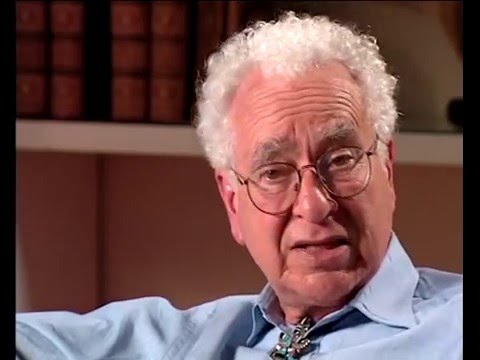Web of Stories – Life Stories of Remarkable People
To listen to more of Murray Gell-Mann’s stories, go to the playlist: https://www.youtube.com/playlist?list=PLVV0r6CmEsFxKFx-0lsQDs6oLP3SZ9BlA
New York-born physicist Murray Gell-Mann (1929-2019) was a theoretical physicist. His considerable contributions to physics include the theory of quantum chromodynamics. He was awarded the 1969 Nobel Prize in Physics for his work on the theory of elementary particles. [Listener: Geoffrey West]
TRANSCRIPT: In the book I take up many of the themes that we’ve discussed here, but I don’t try to present a summary of my work in elementary particle physics. I do try to present a… a summary of the situation in elementary particle physics, as a very small part of the book and also our views on the modern interpretation of quantum mechanics, but that’s part of a long argument that starts with what simplicity and complexity mean; what a complex adaptive system is like, examples of complex adaptive systems; theory, the role of theory, the role of different levels of theory in science from the most fundamental all the way up to very phenomenological; the fact that one needs to approach problems both from the bottom up, from the top down and build staircases from the bottom up and the top down, but also study each subject at its own level; the difference between fundamental mechanism and semi-empirical rules like scaling rules, for example, which I mention. And then I go on to the fundamental description, talking about elementary particles; about the hope for unification, for example, with superstring theory; talking about the interpretation of quantum mechanics and the probabilistic character of theory and how that’s exacerbated by not knowing a lot of the accidents that have already occurred because they occurred in places where no observer could know about them and exacerbated by the phenomenon of chaos, which even in the classical limit produces an extraordinary sensitivity of the outcome to the input so that even the slightest coarse-graining in the input leads to a coarse-grained future that’s only probabilistically determined by the coarse-grained past. And then I go into discussion of various complex adaptive systems: learning and thinking, creative thinking in human beings, biological evolution, and finally ending up with material on the preservation of biological diversity and of human cultural diversity, and some of the paradoxes associated with the… with the preservation of human cultural diversity, because in many cases the cultures that you may be trying to preserve are hostile to biological… the preservation of biological diversity, hostile to the modern, secular, universalizing, scientific culture that is most concerned about the preservation of cultures, but may be terribly despised by the representatives of a particular culture that one is trying to preserve. All of these paradoxes I mention, and then I discuss the idea behind Project 2050, trying to think about measures that the human race might take to approach closer to sustainability in all these different domains in the course of the coming century, how one might study such things. So it’s a… an argument that runs through most of the interests that I have had in my life, and through most of the subjects we’ve discussed.
Source



